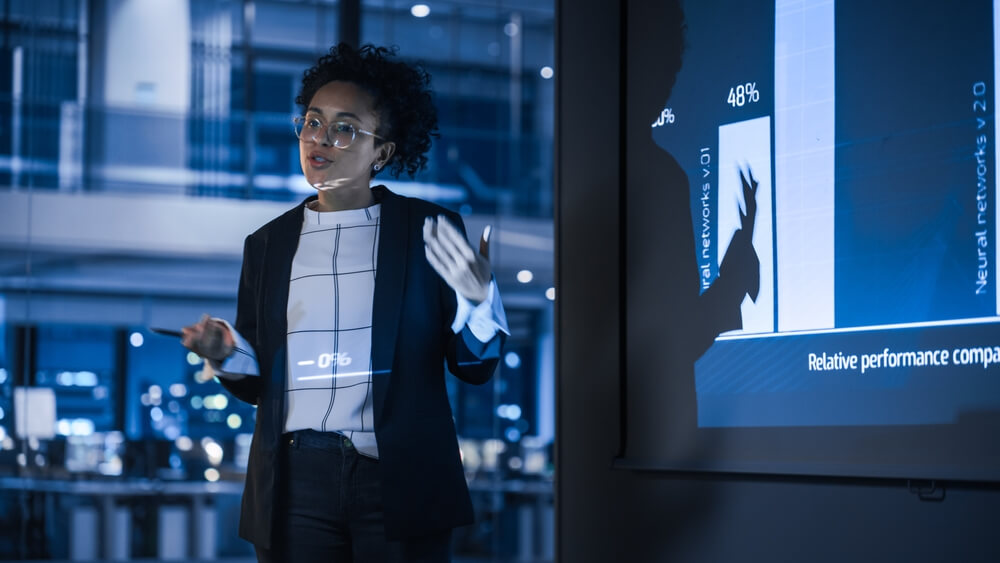Not long after last fall’s boardroom drama at OpenAI thrust issues of governance, stakeholders and mission into the debates over artificial intelligence, Omidyar Network’s Mike Kubzansky learned that OpenAI’s rival, Anthropic, was raising a major round of financing.
Omidyar Network, the philanthropic investment arm of eBay founder Pierre Omidyar and his wife Pam, has for two decades been an active startup investor and champion of impact investing. In recent years, it has had a strong focus on responsible technology and inclusive AI.
“So I called somebody I knew at Anthropic and said, ‘Hey, would you be interested in having somebody on your cap table who is invested in the mission components?’” Kubzansky told ImpactAlpha. “‘Would it be helpful to have somebody who is there for the returns, but also for the impact considerations?’”
Kubzansky was apparently too late to get into that round, which was led by Menlo Ventures and ultimately closed at $750 million, part of Anthropic’s whopping $7.3 billion fundraising blitz last year. But he soon got a call back with another opportunity: the sale of nearly 30 million shares of Anthropic that had been held by FTX Trading, the bankrupt crypto exchange once headed by the now-convicted Sam Bankman-Fried.
“I immediately picked up the phone and called Darren,” Kubzansky recounted. That would be Darren Walker, president of the $16 billion Ford Foundation, which has a $1 billion carveout for “mission investments.” Kubzansky followed up with calls to nearly a dozen other foundation heads (disclosure: Omidyar Network and Ford Foundation have sponsored several ImpactAlpha projects, and Ford is an investor in ImpactAlpha).
Last month, Ford Foundation committed $5 million, Omidyar Network $1.5 million and the Nathan Cummings Foundation $1 million to purchase just under 250,000 shares of Anthropic from the FTX estate in an auction brokered by Perella Weinberg Partners. The combined $7.5 million investment from the three impact investors was less than 1% of that $884 million sale and becomes a tiny entry on Anthropic’s overall capitalization table.
For comparison, Amazon paid $4 billion for its stake in Anthropic. Google has invested at least $2.5 billion in Anthropic. Microsoft is a major investor in OpenAI.
“I should say we’re clear on how much influence we get,” Kubzansky said. “We’re under no illusions.”
Constitutional AI
Anthropic was formed in 2021 by several veterans of OpenAI, including the siblings Daniela and Dario Amodei, who were concerned about safety and “alignment” years before the issues broke into the news.
Anthropic incorporated as a “public benefit corporation” in Delaware to enshrine its social purpose into its charter and took the additional step of creating a “long term benefit trust” that over time has the ability to appoint additional directors to Anthropic’s board. For its Claude chatbot, the company pursues what it calls “Constitutional AI” that encodes rules intended “to avoid toxic or discriminatory outputs, avoiding helping a human engage in illegal or unethical activities, and broadly creating an AI system that is helpful, honest, and harmless.” Among the sources: the UN Declaration of Human Rights.
“I think they’ve been referred to as the most anxious people in Silicon Valley because they are relentlessly focused on safety and guardrails and prioritize that over getting to market quickly,” said Roy Swan, who heads the Ford Foundation’s mission investments program. Anthropic’s origin story, he said, is well-aligned with Ford’s technology and society program. Ford and General Catalyst last year supported the development of a “manifesto for responsible AI.”
“We were delighted to hear that the folks at Anthropic were interested investors of our type,” Swan told ImpactAlpha. “The advantage that investors like us bring is the objective viewpoint. We’re only in this to serve our mission.”
The president of the Nathan Cummings Foundation, Rey Ramsey, was also a quick yes. In 2018, the foundation pledged to align its then-$450 million endowment with its philanthropic mission (see, “Rey Ramsey on deploying 100% of foundation assets toward positive impact and racial equity”). But it’s rare for both Ford and Cummings to make direct investments in individual companies rather than through diversified fund managers.
“This was an easy exception, because it’s the ultimate learning opportunity for us,” Ramsey said. Of Anthropic’s governance structure as a public benefit corporation, “Well, that fits like a glove with our desire to marry financial and social benefits.”
Other foundation leaders were also interested, Kubzansky said, but felt they couldn’t muster the necessary approvals in time to meet the auction deadlines. A couple foundations pulled out because their teams weren’t convinced of the impact potential. “‘They’ve got so much money. What do they need our money for?’” Kubzansky says they told him.
Worker voice
The three foundations made the investments from their standard investment pools, without side letters or special agreements that might lock in social-purpose considerations. They hope to have regular consultations with the company and to be able to raise issues as investors, not merely advocates.
“Our main ask is that when AI gets deployed at companies, that workers have a seat at the table,” Kubzansky said. He envisions a “best practices” toolkit the company might provide to customers to get the most out of the tools.
“In some cases, yes, this will undoubtedly make jobs redundant,” he said. “But in some cases, it could actually make less-valuable jobs more valuable and higher-wage. The trick is to have the actual workers at the table when this is getting decided.”
Omidyar Network has backed the AFL-CIO Institute which last year struck a deal with Microsoft to collaborate on issues that arise from the adoption of AI in the workplace.
An obvious risk, all of the investors agreed, is that their philanthropic imprimatur might abet a kind of “impact washing” if Anthropic fails to live up to its stated values. Each said they are prepared to exit the investment and walk away in that case.
“One of the most fascinating things to me about the AI revolution is you’re seeing some real experimentation in governance formats for the first time in a very long time,” Kubansky said. “The hope is to be in conversation with Anthropic and help them to live into their commitments, and to backstop the people who are also trying to help them live into their commitments.”
Kubzansky called the cross between venture impact investing and shareholder activism, “an interesting extension of the impact investing toolkit.”
“There’s interest certainly from us, and from a number of the partners – both who went in with us and were not able to come in with us – to replicate this on a more repeated basis. My hope is this is not the last time we do something like this.”











